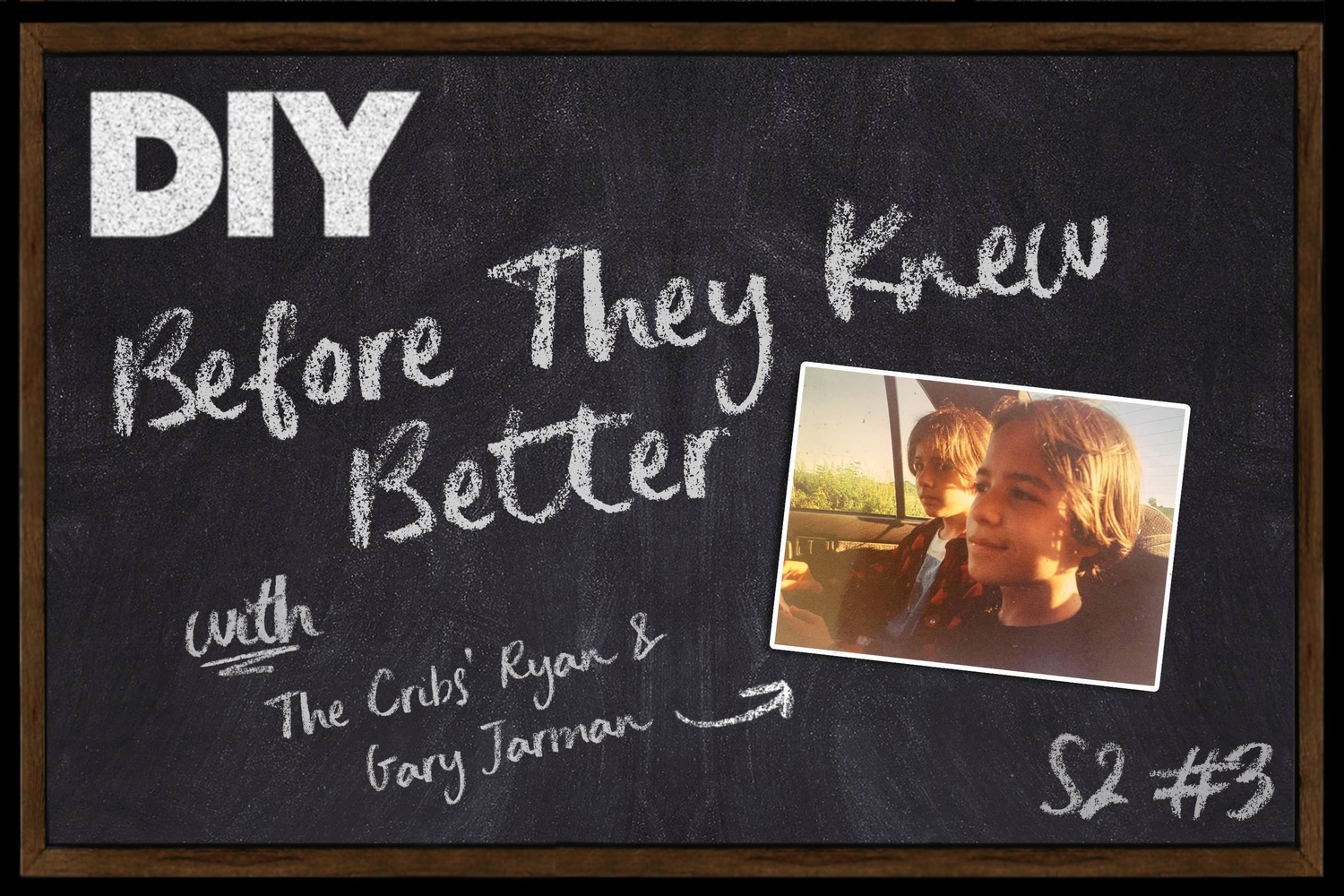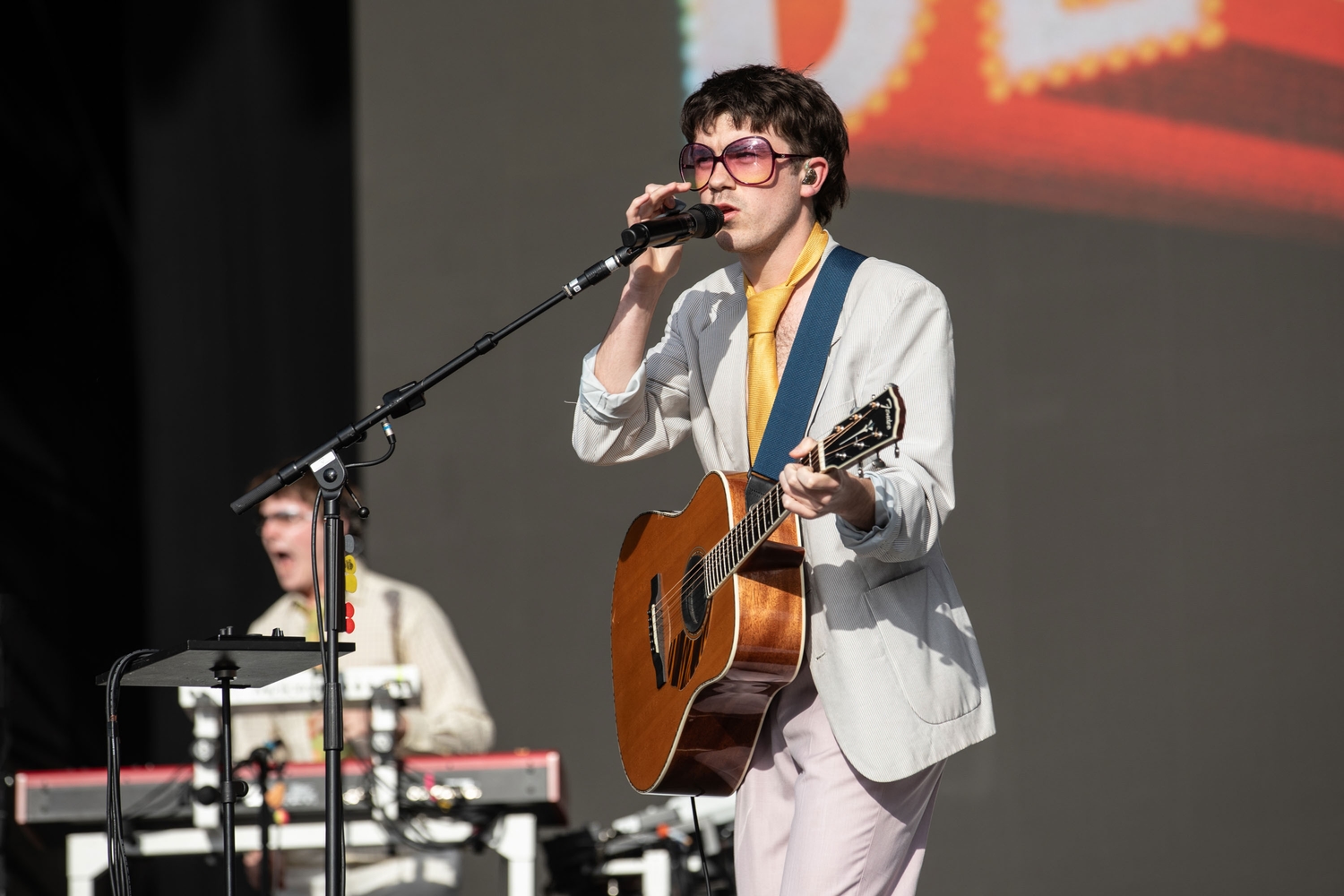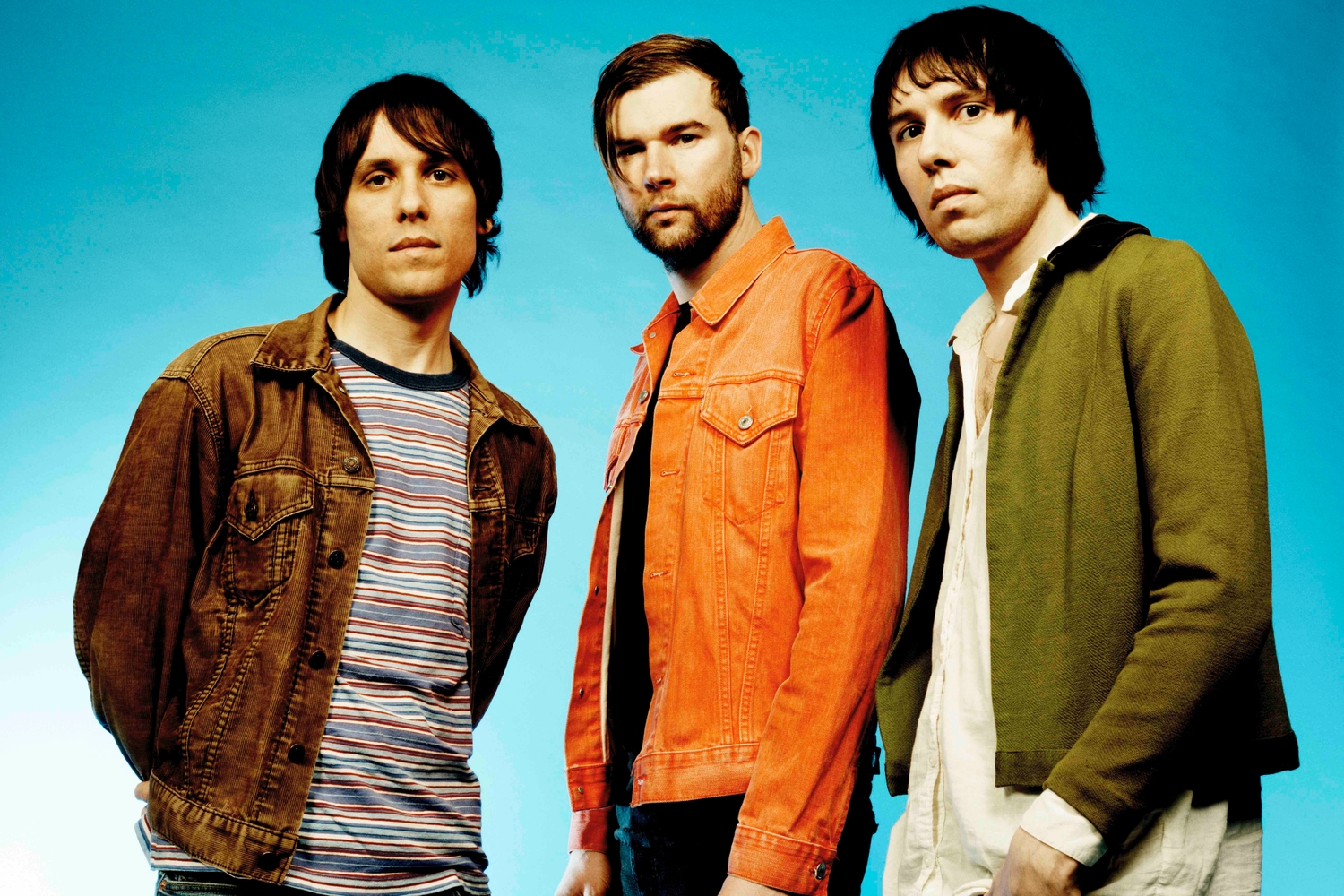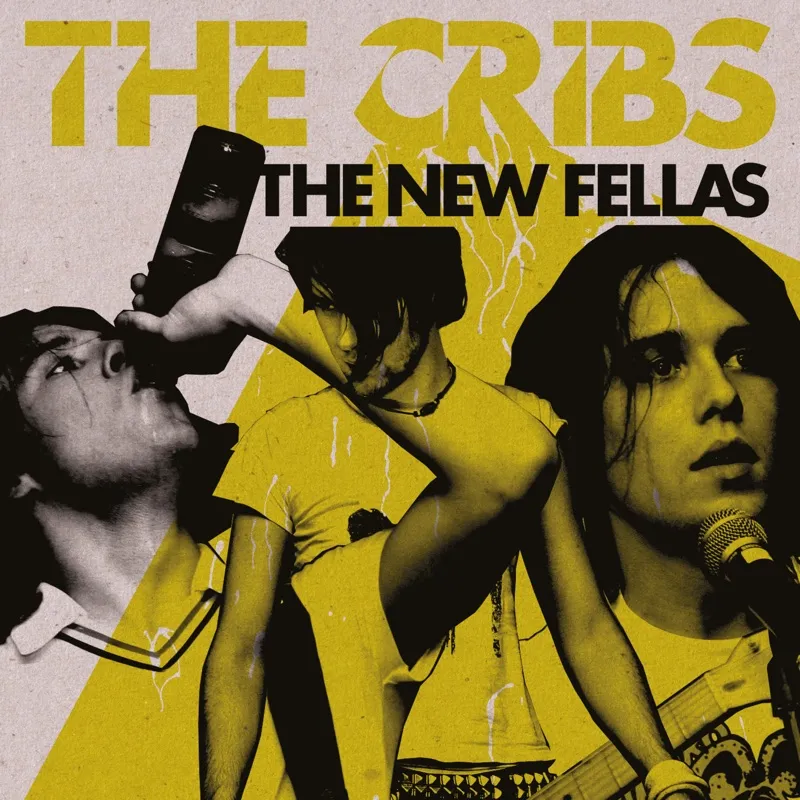Interview The Cribs: ‘We’re Against Taking Yourself Too Seriously’
Gary Jarman chats with DIY about Johnny Marr’s departure, JD Roots, Steve Albini and unseemly perfectionism.
They need no introduction; they’re one of Britain’s best loved indie institutions. Still going dauntless and strong, revisiting and honing the pared-back, DIY aesthetic of yore, The Cribs’ fifth record suggests a first-class return to form. Gary Jarman chats with DIY about Johnny Marr’s departure, JD Roots, Steve Albini and unseemly perfectionism.
Hi Gary. How are you?
I’m not too bad. I just can’t figure out how to use this phone, that’s all. I’m at my brother’s house and I’m not very used to it.
Your new record is called ‘In The Belly Of The Brazen Bull’. Why?
We just thought it sounded cool, really, just like the previous record titles. It’s a phrase we had kicking around for a while and it kept coming back up. I remember we read a book about this kind of gnarly torture device. The description of it was just so evocative of this terrible, cruel way to put someone to death. It just stuck in our heads. It sounded good as a phrase, so yeah, we decided to use it.
Sonically, ‘Chi-Town’ hearkens back to your debut. Was that your intention?
It’s interesting that you say it hearkens back to the debut because we were thinking about making the first record with Steve Albini, and that’s who produced ‘Chi-Town’. He was someone who we wanted to work with for a long time. His swift approach, with a minimum of over-dubs, was great. When we first started out that was definitely in line with the ideals of the band too, because we liked the idea of working that way. I guess Toe-Rag, where we did the first record, was kind of similar to that idea of recording live, doing two or three takes. But I think Steve’s sound is fuller than Toe-Rag’s.
Can we expect the same from the rest of the LP?
As far as the rest of the record goes, that was the only song which Steve did on the record, but the rest are the same in their approach, in that we tried to capture the energy of the room as much as we could, just not getting too caught up in nit-picking and perfectionism. Digitally, it definitely allows you to do that. I guess that works for some people, but for a band like us I think it’s better to not get caught up in that. The rest of the record follows in that vein but the Friddman stuff was a bit more textural.
Overall, how did you find the experience of working with both Steve Albini and David Friddman?
It was great because we knew what we were going to get before we went in, to some degree. We’d never met either of the producers before but Dave was someone who we’d wanted to work with for a while and we knew quite a lot about Dave’s production. We’d been a fan for a long time. He’s a really great guy. He’s very calm in his demeanour but he really pushes you into experimenting. Even if you’ve got a good take, he’s just like ‘I think we should go again and mess around with some stuff’. He pushes you into a situation where you try things that you wouldn’t usually. Even though I felt we had some pretty good backing tracks, his sounds are pretty much as they are in the room. He doesn’t use a lot of trickery. So, when we got the backing tracks down, we were really happy with it. But he was still saying ‘we should go back in and mess it about a bit’. He pushes you into, well not ‘pushes’, let’s think of another way of putting it… He certainly encourages you to do things that wouldn’t normally and that was really great. That’s what he’s really good at.
With Steve, there are a lot of things written about him and commentary on the way that he is, but I think, for the most part, it’s a little bit misleading. If you go in there expecting to be recorded by a punk rock guy who’s been in punk rock bands for years, then you pretty much know what to expect then. And that’s really all Steve is. He’s really not as prickly or as cantankerous as a lot of people would have you believe. I think his general attitude just rubs up the straight people at record labels, which I can understand. So, he was great. We had a really fun time.
So, are there any particular records produced by those two which you’d say you’re influenced by?
Yeah, definitely. I think with Albini, obviously ‘In Utero’ was the massive record when I was a kid. I loved it. It was the first time I’d ever heard a record which sounded like that. When you’re quite young – that record came out when I was 13 – all you’ve really heard prior to that is just pop music, and maybe Queen records and ‘Nevermind’. They’re all polished records and I’d never really heard a rawer sounding album. To me, it just sounded amazing. That left a real impression on me. It’s still one of my favourite productions ever. We were definitely big fans since then and then we discovered loads of other records. ‘Pod’ by the Breeders sounds great. It’s definitely not the typical Albini production but I love the sound of that record.
With Friddman, it was ‘Clouds Taste Metallic’, the Flaming Lips album. It’s just got the best kick-drum sound ever. And then also ‘Pinkerton’ by Weezer which he did. Again, I got that when I was about 15 or 16 and I was just blown away by the drum sound. As a band, The Cribs have always been interested in the drum sound more than anything. And me and Ryan have produced records before and run a little studio, but the thing that we listen out for, and the thing that’s most important, is how the drums sound. We’re more interested in ‘live’ sound in the studio, really, as opposed to processed sound.
You said the recording of the new album has sort of reverted to how it used to be on the first album. But how would you say song-writing has changed since you started out?
Some of it’s similar because I think for a long time we just worked by getting together in a room, playing, firing up one another and enjoying that spontaneity of just playing together and not really knowing where we were going to go. We’d just set a minidisc player recording, jam and pick our favourite parts. That’s what we used to do. We still do that to a degree, but not quite as much because we all live in different places now. Sometimes I’ll bring songs that I’ve recorded in the basement to the band and have them put their ideas in. And Ryan and Ross will do the same because they would get together and play together, then I’d come along and put my ideas in too.
We try not to finish the songs without each other having any input. Whatever I could do with a home recording, Ryan could come up with a much better guitar part than me, and the same with Ross on the drums. We always like to make sure everyone gets their input, and vice versa, you know. When Johnny [Marr] was in the band, it definitely changed the way we went about things to some degree, because we had to accommodate an outside influence, which was different for the dynamic. Maybe it had a lasting impression on us because right now we consider ourselves as separate musicians, rather than just one unit, which is how we used to feel.
So, do you think Johnny’s integration and subsequent departure also had a lasting impact on your sound as a band?
I’m not so sure, because a lot of the commentary that happened on the fourth record, it seemed like the general consensus and opinion changed after Johnny left. A lot of the interviews I did after Johnny left were all saying stuff about how people felt it was a compromise and that we were mellowed out by that point. I remember when the record came out, I don’t think many people were saying much about that. I think the perception changed slightly over time. But those are still our songs, first and foremost. I mean Johnny had an input on the songs just like anyone else does. But he pretty much worked in the exact same way that we did, and so it’s not like there was a dictator, benevolent or otherwise, on that record. It was probably still where we would have been at that point. But it wouldn’t have been exactly the same obviously, because it wouldn’t have had Johnny’s parts on it. We were definitely putting it in a direction I wanted the band to go, more thoughtful if you like.
We always tend to react against the previous records but this new record definitely has elements with are in common with ‘Ignore The Ignorant’. Really, we were just enjoying the more visceral element again, the playing together and trying to record it all as ‘live’ as possible. That was the thing that always seemed to get us excited in the first place. We just returned to that.
You toured the UK briefly earlier this year. How did you find that?
It was really, really fun. We’d actually just got back from our tour in America and it was our first time touring as a three-piece for a long time. It was so much fun. I got really stressed out when we toured our third and fourth albums. I think I was just a bit burnt out the whole time, and then when Johnny joined it changed the dynamic. I felt like I had to sit back a little bit. After this break we’ve just had, it’s reminded me how fun it is play. It was really good being in those slightly smaller venues, but the energy translates really well. I think it was a good reintroduction for us.
Spectrals and This Many Boyfriends, two Yorkshire-based bands, supported you at ULU in February. Are there any other smaller bands, local or otherwise, which you love at the moment?
Yeah, it wasn’t intentional actually… I didn’t realise that both bands were from Yorkshire. But I really don’t care about regionalism and it wasn’t something that was intentional. It’s just Spectrals are on Wichita and that was a connection there and then This Many Boyfriends because Ryan was producing them, really. We weren’t aware of the regional element of it. Especially me, because I actually live 5,000 miles away from Yorkshire now. I certainly wasn’t aware of it.
But I think there are some great bands coming through right now. I don’t know exactly how new they are, but there’s a band called Mister Heavenly, who are on Sub Pop. I’m a fan of theirs. It’s Nick from Unicorns, Joe from Modest Mouse and Ryan from Man Man. There’s also a band called Hurry Up from Portland. They’re local to me. I think that’s got two members of the Thermals in it and one member from Bangs. They’re a great three-piece punk rock band.
How do you find crowds differ in their receptiveness depending on where you play?
That’s a funny one. It’s kind of source of frustration for us because I find that when we play hometown shows, people are really passionate and even at any show in England, we always have very dedicated fans, and that’s a really cool thing. At the same time, I find that sort of dedication makes it difficult for you to take bands that you really love on tour because the crowds are so, like, partisan that it’s a really difficult gig for all the support bands that we like and care about. So, it feels like a bit of a burden, in some ways, whereas when we tour in America, because people don’t have that same connection to you. The gigs are great, you obviously have fans out there but those people are way more receptive to all the other bands who play before because they don’t have that sort of partisan support. I actually really enjoyed doing the American tour for that reason because you feel freer, really. I like everything about the show… it’s not just about us… and it’s not just about how we feel our own show. I kind of hate it when our support bands get a hard time, which does happen occasionally. I think I’ve become really paranoid about it to the degree where I don’t like to us to have bands that I really love to go on tour. I mean we still do it, but it definitely makes us feel uneasy.
You’re also playing a JD Roots show, for Jack Daniel’s, in Wakefield pretty soon (16th May). According to the press release it’s about ‘what makes a band’s hometown special and how it made them the artist they are’. Would you agree?
I think it’s something that we can’t escape. There’s an inescapable element in that we grew up in a small town and that there weren’t really many shows. No one really paid any attention to it; none of the touring bands ever came through there. There was also an element of feeling like everything was all forgotten, and that it was all hopeless. That was what inspired us to start a studio and start playing gigs. I definitely think that’s become an inherent part of our personality and our character: trying to do as much as you can by yourself. I think the fact that Wakefield was somewhat overlooked meant that we had a lot of time to develop and do whatever we wanted. All those things have stuck with us.
But like I said, I’m not particularly ‘regional’. I don’t get too hung up on stuff like that. We definitely wanted to play Wakefield again. We hadn’t played it for quite some as it’s quite difficult for us to play because we can only really play a small venue, which is fun, and which I would like to do, because they don’t have any larger venues, but the problem with playing smaller venues is that they’re not properly equipped to have security or barriers and stuff like that, which unfortunately the promoters always insist on. So, it works out too expensive for the clubs to do it and then they want big deposits for damages and stuff like that. At the end of the day, it’s our responsibility but it’s kind of been impossible for us to play there for a long time and we didn’t want to feel like we were alienated from people. We don’t want to seem like ‘we started touring, and we now we’re never coming back to Wakefield’. That would be lame but unfortunately it’s just been impossible to do it unless we were prepared to pay a load of money to cover all those extra costs. That’s the reason that we took this opportunity, now there’s someone willing to put it on, you know.
You’re also playing Reading and Leeds before At The Drive-In. Are they a band which means something to you?
I did like At The Drive-In when they came out. I really like the spirit of them and stuff like that. They’re not one of my particular favourite bands but I like their records. It should be fun to play with them I guess. They came out at a time when I was more into other things but I did like them.
Finally – yesterday I watched a video of Ryan being interviewed by a seven-year-old girl. Hilarity aside, it actually brought up some quite interesting points. At one point Ryan says, ‘We’re just a band. We just make music. It’s supposed to be fun, right?’. What do you think?
I think with any art form, it’s whatever you get out of it. It’s whatever the people who care about get out of it. But as far as taking yourself too seriously, that’s kind of the big thing that we’re against. As a band, we believe that it is what it is. Particularly with punk music, I’m not going to try and make myself to be anything other than what I am. I believe in just not taking yourself too seriously, not getting a big ego and not setting yourself up as being a ‘rockstar’. It’s just better to be offhand and take it for what it is. When we first started out, it was purely for fun and to have an outlet that we enjoyed.
The Cribs’ new album ‘In The Body Of The Brazen Bull’ will be released on 7th May. To find out more about JD Roots, visit jdroots.co.uk.
Read More

Before They Knew Better welcomes The Cribs’ Ryan and Gary Jarman
It's the first episode to have featured two guests, not to mention siblings!
16th April 2024, 10:00am

Declan McKenna, The Cribs, Future Islands and more to play Live At Leeds In The Park 2024
The outdoor festival will return to Temple Newsam Park next May.
23rd November 2023, 2:52pm

The Cribs share latest Sonic Blew Singles Club release
They're sharing 'The Day I Got Lost Again' and 'Opaline And Evergreen' today.
22nd October 2021, 12:00am

The Cribs reveal ‘Swinging At Shadows’ video
It's the first release of their ‘Sonic Blew Singles Club’.
13th September 2021, 12:00am
Featuring SOFT PLAY, Corinne Bailey Rae, 86TVs, English Teacher and more!

